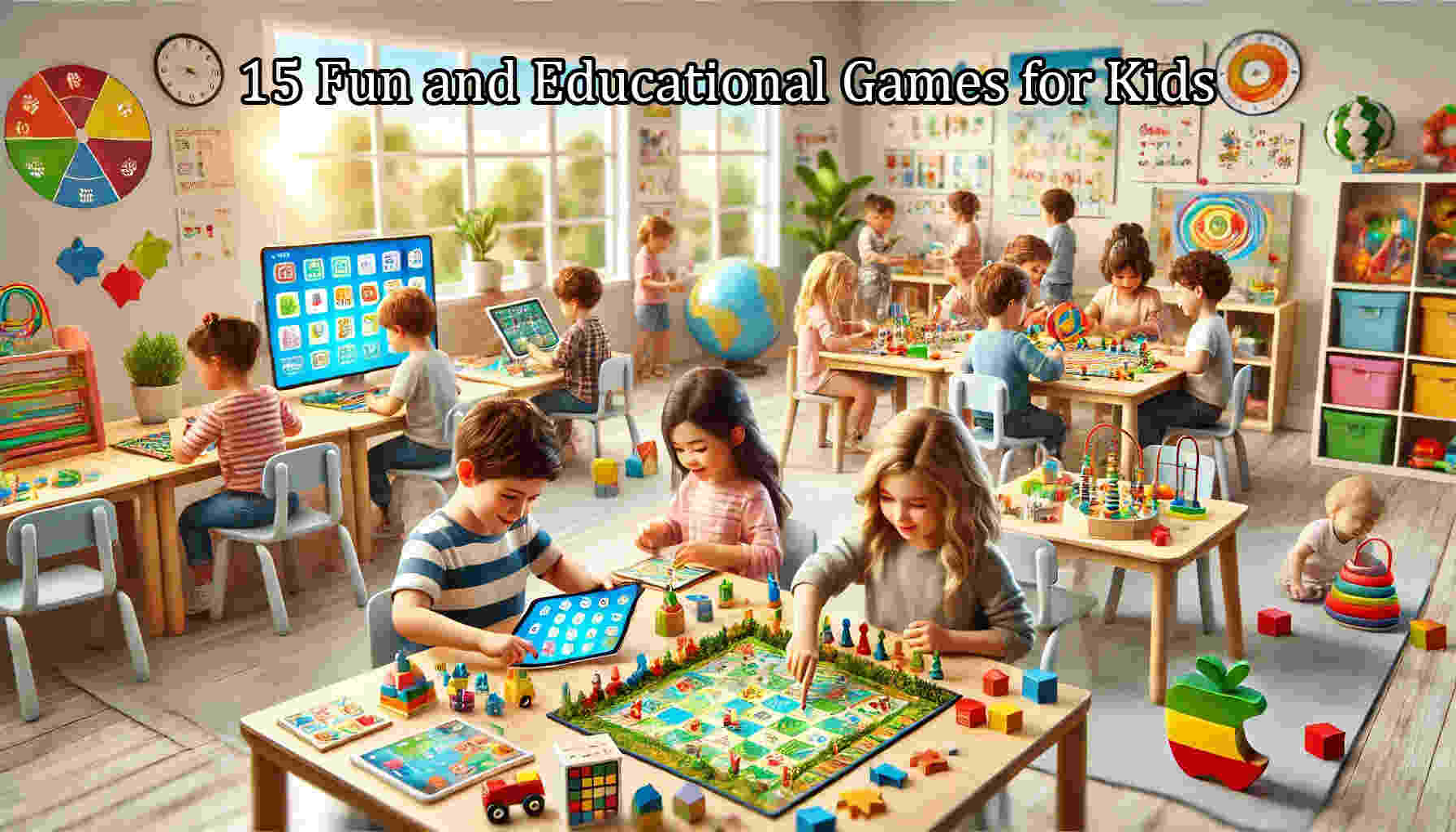🧠1. Simon Says (Ages 3+)
Skills Developed: Listening, concentration, coordination
🎮How to Play: One player is the leader and gives commands like “Simon says touch your nose.” Players must only follow instructions that start with “Simon says.” If they follow a command without “Simon says,” they’re out!
Why It’s Great: Enhances listening skills and teaches kids to pay close attention to details.
2. Scrabble Junior (Ages 5+)
Skills Developed: Spelling, vocabulary, strategic thinking
🎮How to Play: Players create words using letter tiles. The junior version includes a pre-printed board to help beginners form words easily.
🧠Why It’s Great: Encourages word recognition, improves spelling, and fosters friendly competition.
3. Math Bingo (Ages 6+)
Skills Developed: Arithmetic, problem-solving, quick thinking
🎮How to Play: Instead of regular bingo numbers, kids solve math problems (addition, subtraction, multiplication, or division) to mark off spaces on their bingo card.
🧠Why It’s Great: Turns math practice into an exciting game, making learning fun and interactive.
4. Pictionary (Ages 6+)
Skills Developed: Creativity, communication, teamwork
🎮How to Play: One player draws a word or phrase while teammates guess what it is within a time limit.
🧠Why It’s Great: Encourages visual thinking and helps kids improve their vocabulary and quick-thinking skills.
5. Treasure Hunt (Ages 4+)
Skills Developed: Problem-solving, critical thinking, teamwork
🎮How to Play: Hide objects around the house or backyard and create clues leading to the treasures.
🧠Why It’s Great: Enhances kids’ ability to follow directions, solve puzzles, and work as a team.
6. LEGO Challenges (Ages 4+)
Skills Developed: Engineering, creativity, spatial reasoning
🎮How to Play: Give kids a specific challenge (e.g., “build a bridge” or “create a car”) and let them use LEGO bricks to complete it.
🧠Why It’s Great: Encourages hands-on problem-solving and creativity, helping with fine motor skills.
7. Chess for Kids (Ages 6+)
Skills Developed: Strategy, logical thinking, patience
🎮How to Play: Players follow chess rules to capture the opponent’s king using strategic moves.
🧠Why It’s Great: Enhances critical thinking and planning, teaching kids patience and decision-making.
8. DIY Science Experiments (Volcano, Slime, etc.) (Ages 5+)
Skills Developed: Scientific thinking, curiosity, hands-on learning
🎮How to Play: Set up simple experiments like making a baking soda volcano or homemade slime to teach kids about chemical reactions.
🧠Why It’s Great: Helps kids learn science in an exciting and interactive way, fostering curiosity.
9. Storytelling Dice (Ages 4+)
Skills Developed: Creativity, language skills, imagination
🎮How to Play: Roll a set of dice with pictures or words, and kids must create a story based on what they roll.
🧠Why It’s Great: Helps with storytelling skills, expands vocabulary, and encourages imaginative play.
10. Memory Card Games (Ages 3+)
Skills Developed: Concentration, memory, cognitive skills
🎮How to Play: Lay cards face down and take turns flipping them over to find matching pairs.
🧠Why It’s Great: Improves short-term memory and focus while being an easy and fun game to play anywhere.
11. Typing Games (Like Nitro Type or Dance Mat Typing) (Ages 7+)
Skills Developed: Typing speed, hand-eye coordination, digital literacy
🎮How to Play: Kids play interactive online games that require fast and accurate typing to win races or complete challenges.
🧠Why It’s Great: Prepares kids for the digital world by improving their keyboard skills in a fun way.
12. Geography Puzzles & Quizzes (Ages 6+)
Skills Developed: Geography knowledge, map skills, global awareness
🎮How to Play: Use apps, board games, or puzzles to learn about countries, capitals, landmarks, and continents.
🧠Why It’s Great: Makes geography fun and interactive, helping kids understand the world better.
13. Coding Games (Scratch, Tynker, etc.) (Ages 7+)
Skills Developed: Problem-solving, logical thinking, programming skills
🎮How to Play: Kids use platforms like Scratch or Tynker to create animations, simple games, or interactive stories using coding blocks.
🧠Why It’s Great: Introduces kids to coding in an easy and fun way, preparing them for future tech skills.
14. Music Games (Rhythm-Based Apps or Karaoke) (Ages 4+)
Skills Developed: Rhythm, musical creativity, coordination
🎮How to Play: Kids can use rhythm-based apps (like Just Dance or GarageBand) or play instruments in a game format to learn music.
🧠Why It’s Great: Encourages self-expression and helps develop a sense of rhythm and coordination.
15. Outdoor Obstacle Course (Ages 3+)
Skills Developed: Physical fitness, teamwork, goal-setting
🎮How to Play: Set up an obstacle course in the backyard with activities like jumping over ropes, crawling under chairs, or balancing on a beam.
🧠Why It’s Great: Promotes physical activity, improves coordination, and encourages kids to stay active while having fun.
Final Thoughts
These 15 fun and educational games help kids develop various skills while making learning enjoyable! Whether it’s building creativity with LEGO, improving strategy with chess, or practicing math with bingo, these games provide great learning experiences in a playful way.
